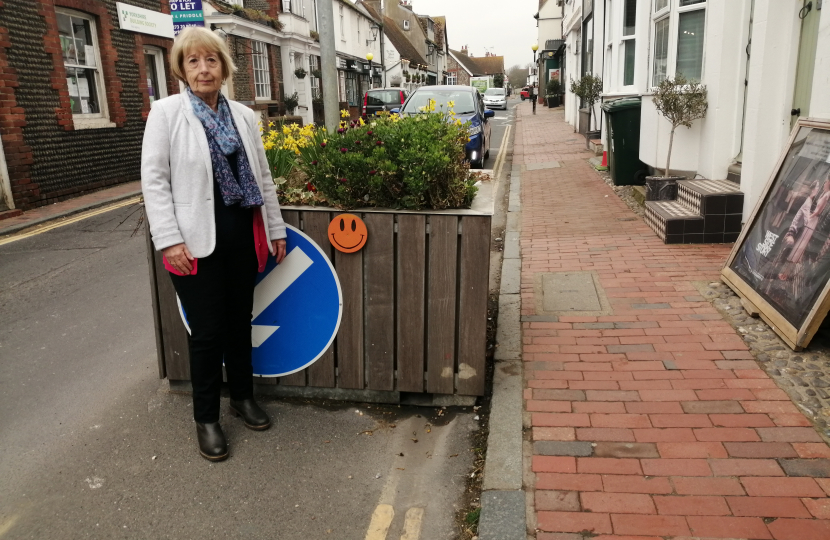
With a by-election underway in the historic village of Rottingdean, one issue is attracting strong opinions more than any other on the doorstep.
Rottingdean’s narrow High Street has been placed under an experimental trial by the Council since 2019 in a bid to address air quality issues in the town centre.
The Council’s measures, which have now been in place for almost three years, most noticeably include a temporary chicane south of the zebra crossing, made up of a giant planter box blocking the southbound lane, designed to separate vehicles as they approach the junction and disperse pollution.
Other parts of the experiment include a yellow hatched ‘no stopping’ box on the southbound lane from the southern building line of Dene’s Mews and a ban on right turns out of West Street.
The Council originally said that the trial would last 18 months, with evidence to be collected before a decision would be made on whether to make it permanent, however last year an extension for a further 18 months was put in place, with the Council arguing that Covid has disrupted the evidence collecting work.
Now, nearly three years on, the measures are attracting strong opinions from local residents.
Our Conservative Candidate for the Rottingdean Coastal by-election Lynda Hyde, while out doorknocking, has been collecting views on the planter in the High Street and has found a number of issues that have come to the fore and need to be addressed.
Residents have told Lynda that they think the planter is creating more pollution because there is more traffic queueing back further back down the High Street, extending the area of pollution.
They are concerned that it is creating pedestrian safety issues, including pushing traffic towards a very narrow pavement where people are walking opposite the planter. There are serious concerns that pedestrians on the crossing cannot be seen by ongoing traffic because the queue of traffic is blocking the vision of the drivers.
There have also been a few near-misses as traffic turns left into the High Street from Park Road. This is because the traffic driving around the planter is now on the wrong side of the road.
All in all, there is concern from residents that the trial measures, deeply unpopular with some, have been allowed to remain in place for too long and that the Council is not seeking enough feedback from local residents about the issue. There is a feeling that the changes are being introduced through the back door and could be made permanent at any moment.
Residents have due cause for concern given the recent history of this Brighton and Hove City Council in introducing experimental traffic orders. The use of experimental orders has been a common theme since 2019 under the Labour/Green Council, which has seen controversial measures being introduced by executive direction to bypass residents. Such experimental traffic orders do not require any democratic vote and are introduced by the administration without debate, with experience showing that these then become extremely hard to unwind and a fait accompli for the Council.
A raft of such measures have been implemented by Labour and the Greens since 2019, including the hugely unpopular Old Shoreham Road cycle lane. These lanes were introduced by the stroke of a pen by a Labour Councillor under an experimental order but took the community 18 months to have removed, with residents having to fight a fierce campaign, involving multiple petitions, two Council consultation exercises and over 6 votes at Council meetings.
Other experimental measures have quietly been fixed in place. The confusing Valley Gardens Bus Gates, last year found to issuing a fine to an unsuspecting motorist every two minutes, have now been made permanent by Labour and the Greens. These bus gates, which are not clearly marked out, netted the Council £2.2 million in their first full year of operation. Other experimental measures such as the A259 cycle lane and the closure of a lane of Madeira Drive have also been made permanent by stealth.
Residents in Rottingdean are concerned that this is dragging on and they too will get little say in whether these measures in Rottingdean High Street are eventually made permanent or not.
Lynda Hyde has said that she will be bring motions forward for an urgent update on Rottingdean High Street planter if elected through policy committees to make sure that this contentious issue receives the upmost scrutiny and that residents and the local businesses are listened to.
Our city cannot afford any more experimental Labour/Green transport schemes, which tend to create more pollution, not less. We and must move to an integrated Transport approach in the future where we consider the traffic flow of the city as a whole.



